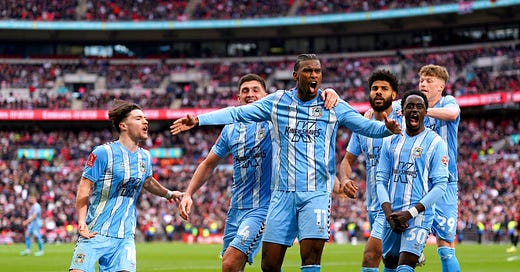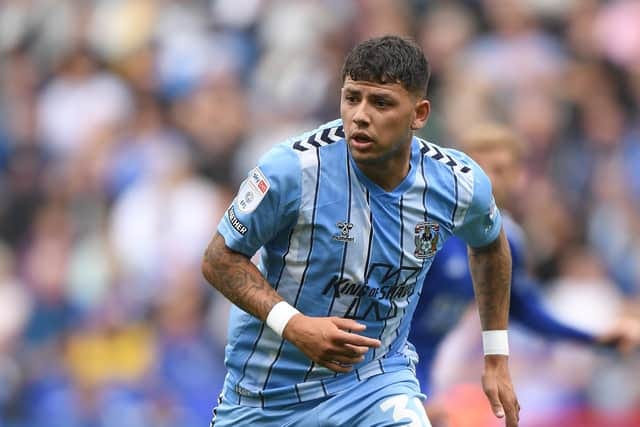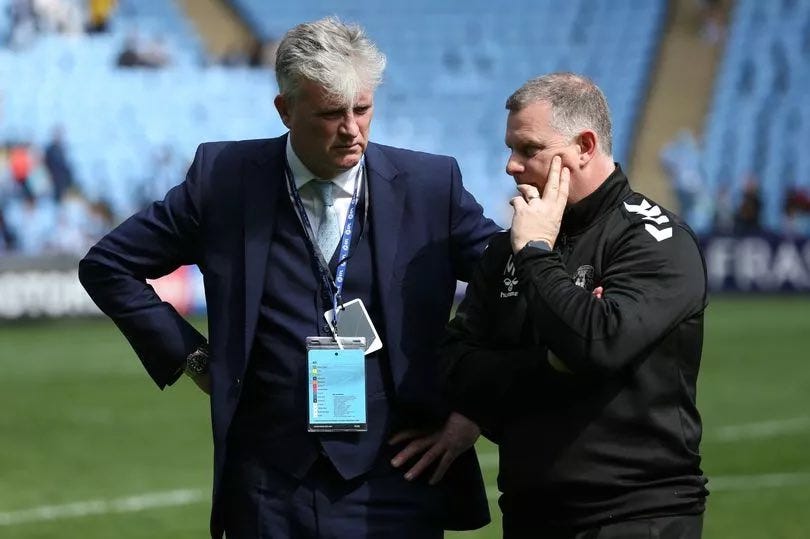Coventry City's patient progress
The Sky Blues may have dropped down the table this term but they're in a much stronger position than 12 months ago
On 13th April, Coventry City’s lacklustre 3-0 defeat at the hands of their former landlords Birmingham City virtually ended any hopes of a second successive play-off finish. Further reverses followed and the campaign fizzled out, with a miserly one point collected from the final six fixtures.
Having returned to the second tier in 2020, this was the first season in which the Sky Blues were among the division’s pre-season favourites. Mark Robins’ men had come within a gut-wrenching penalty shootout defeat of the Premier League in May 2023 and with £30m received from the sales of Viktor Gyokeres and Gus Hamer, a lot was expected. In this context, a final position of ninth (a regression of four places) may appear disappointing, however this campaign has been one of immense progress.
In the wake of the Wembley heartache, the recruitment team sensibly focused on raising the floor of the squad, spreading the Gyokeres and Hamer money across the pitch. American international striker Haji Wright arrived for a club record £8m and the acquisition of target man Ellis Simms’ services set owner Doug King back a further £4m. The defence was rebuilt too, with Milan Van Ewijk, Bobby Thomas and Liam Kitching all commanding multi-million pound fees.
Initial results were disappointing and the Sky Blues were left marooned in 20th place after 14 matches. Although the team was assembled in the previous season’s 3-5-2 shape, the devastating counter attacks that had characterised the play-off run were nowhere to be seen as Robins tried to exert more control over games. With the defence pushed higher up, captain Kyle McFadzean’s lack of pace was targeted by opponents. Chances were created at the other end but new boys Simms and Wright were worryingly profligate.
This left Robins in a tough position. The rest of the league had moved on and suddenly his system felt outdated. Yet, having recruited for a 3-5-2, there was no glaring solution to this tactical problem.
His response was to move left-footed attacking midfielder Tatsuhiro Sakamoto onto the right wing. His tendency to drift inside and take shots caused problems for opposition defences while also providing space by the touchline for the energetic Van Ejwik to maraud into. On the other flank, the misfiring Wright was switched into a position where he could use his athleticism to hold width and stretch the play without carrying the goalscoring burden.
Callum O’Hare timed his return from an injury-plagued eighteen months perfectly and the disjointed attack finally had the link player it had been sorely missing since Hamer’s departure. Youngsters Thomas and Kitching were trusted to marshal the defence without the presence of McFadzean, who was thanked for his service and sent to Blackburn. By January, the Sky Blues were in the top six.
This blend of patience and innovation was typical of Robins’ work since he returned for a second spell at Coventry in 2017. After masterminding promotion from League Two (and the Sky Blues’ first top six finish in any division for half a century), he spent a year acclimatising to life in the third tier before storming the Covid-hit 2019-20 season, utilising a unique 3-4-2-1 box midfield formation. Two seasons of steady Championship progress ensued and by the time the playoff final was reached, the gameplan had been tweaked to include two forwards and a three-man midfield.
Patience was demonstrated off the pitch too. This was welcome because further improvement was needed; the 58 goals scored and 70 points accrued in the previous campaign would need to be bettered if Coventry were to come close to the Premier League again.
The club recognised the brutal truth that on paper, the class of 2023 weren’t as good as their league position suggested. Beyond the superstars of Gyokeres and Hamer, the squad remained unremarkable by Championship standards with a raft of mostly solid but unspectacular loanees. Ben Wilson, Kyle McFadzean and Matty Godden, three players the wrong side of thirty who had spent the majority of their careers operating in lower divisions, were regular starters too. Their presence in a promotion-chasing side, while a testament to Robins’ ability to eke every drop of quality out of his players, was a sign that the feat probably wasn’t repeatable without serious change.
They would be facing stiffer opposition too. As a promoted trio, Burnley, Sheffield United and Luton were historically weak. In their place arrived 2021 FA Cup winners Leicester City, a Southampton side fresh from 11 successive top flight seasons and a star-studded Leeds United. Despite his ambition, King was happy to give Robins the time and space to gel his new look outfit, instead of demanding instant success in a tough environment. For this he deserves credit; many in his position would have pressed the panic button and changed course during those difficult Autumn months.
More composure was demonstrated in January as the hierarchy chose to wait for the right player rather than change their strategy. Peterborough’s Ephron Mason Clark was identified as the club’s preferred target but with Posh in a promotion race of their own in League One, the deal was only sanctioned on the condition that he would be loaned back for the rest of the season. Even with a growing need to recruit wide attackers in the wake of Robins' formation change, Coventry were willing to wait to secure their man, accepting the trade off of putting square pegs in round holes during the run-in.
Though a combination of injury to Sakamoto and FA Cup fixture congestion caused the Sky Blues to run out of steam, there were individual success stories in this difficult period. In the fifth round cup tie against non-league Maidstone United, Robins gave Ellis Simms the nod up front. A confidence-boosting hattrick followed and the man who had been labelled as a flop became the division’s most in-form forward in the spring. Haji Wright flourished in his new role too, terrorising the Manchester United defence at Wembley and eventually taking his final league tally to 16 goals.
The key difference from twelve months ago is that Coventry own all of their best players. They don’t need to sell this summer but if they decide to cash in, Simms, Wright, Sakamoto, Van Ejwik and battling midfielder Ben Sheaf would all fetch far in excess of the fees they commanded upon arrival. Add Mason-Clark and a couple of exciting loanees (a market they neglected this season) to this spine and the Sky Blues will be competing next time.
With Leicester out of the picture and Southampton and Leeds likely to either be joining them or staying put with weaker squads, the competition will be less cut-throat. Coventry’s decision to keep calm and solidify their foundations was a shrewd one, especially when others around them gambled. Their approach stands in stark contrast to fellow play-off chasers Hull City, who took risks on expensive temporary additions in their failed bid for sixth place. Having controversially sacked Liam Rosenior, the Tigers will start 2024-25 with a new manager and a squad in need of significant surgery.
The fact that the early season disappointment at Coventry never transpired into serious murmurings about a managerial change speaks volumes about the patience of the fans, and Robins’ god-like status among them. There is no reason why the Championship’s longest serving boss cannot lead his troops on the final stint of their journey into the Premier League either. At 54, he is a wily operator well-suited to guiding and nurturing an increasingly inexperienced team, but crucially, with bright young things like Marti Cifuentes and Danny Rohl appearing on the scene, the vultures will probably look elsewhere when the first Premier League P45s are handed out in the Autumn.
In a world in which dead rubber results in April and May have a disproportionately significant bearing on post-season discourse, Coventry City have every reason to be optimistic in the summer months. Any success will hinge on successful transfer dealings and if recent history is anything to go by, that is well within the capabilities of Robins, King and co. If they finally manage the jump to the Premier League, they will not only earn plaudits but leave behind an intelligent blueprint that their Championship rivals would do well to follow.







